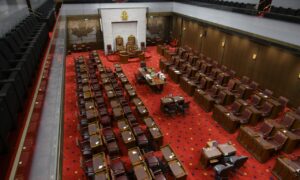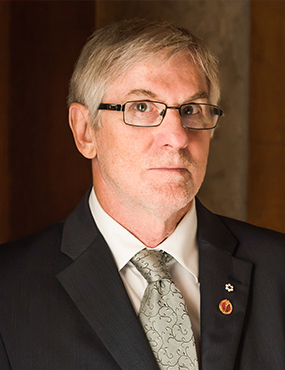Peter Menzies: ‘A Horrid Thing’: Sen. Richards’ Withering Rebuke of Bill C-11
Commentary Canada’s first wave of internet speech regulation was poised to pass in the Senate this week but not before it was rhetorically demolished by one of the nation’s leading authors. “The idea of any hierarchical politico deciding what a man or woman is allowed to write to fit a proscribed national agenda is a horrid thing,” Sen. David Richards, a Liberal appointee from New Brunswick, told the Senate during third reading of Bill C-11, the Online Streaming Act. Sen. David Richards “I am wondering if anyone on the staff of our Minister of Canadian Heritage understands this. In Germany, it was called the National Ministry for Public Enlightenment, and every radio station was run by Joseph Goebbels—complete ideological manipulation in the name of national purity.” Bill C-11 is the first of three pieces of legislation being introduced under the watch of the Liberal government. It puts regulation of the global internet under the authority of the Canadian Radio-television and Telecommunications Commission (CRTC), which defines what qualifies as official Canadian content (CanCon). The other bills are the Online News Act, upon which the Senate is about to deliberate, and the Online Harms Act, which has yet to be introduced in the House of Commons. When initially introduced, Sen. Richards, who has won Governor General’s Award for both fiction and non-fiction, two Gemini Awards for screenwriting, and the esteemed Giller Prize, gave the Online Streaming Act and the official CanCon establishment it protects a withering review. “Some years ago, I was at a dinner with some very important, famous people. One academic mentioned that he had given his entire life for Canadian literature,” Richards told the Senate in June 2021. “Others there applauded him for doing so. When I was writing my fourth novel, we sold our 20-year-old car to pay the rent; and my wife, to keep us alive, was selling Amway door-to-door in the middle of winter. I believe she gave her life for Canadian literature as well, but she didn’t get to that dinner. “For that reason, in her honour, I will always and forever stand against any bill that subjects freedom of expression to the doldrums of governmental oversight, and I implore others to do the same. I don’t think this bill needs amendments; I think, however, it needs a stake through the heart.” Bill C-11 pits Canada’s approved CanCon producers, who have plied their trade for decades thanks to government funding, against the country’s market-based, unregulated creators who have blossomed on platforms such as YouTube. Notable success stories among the latter include musicians such as Drake, Shawn Mendes, and Justin Beiber, none of whom would qualify as official CanCon artists. It also defines the internet as broadcasting and puts it under the control of the CRTC’s government-appointed commissioners. They, through the Broadcasting Act, are empowered to assure content is of a “high standard”—a term so loose and sweeping it permits censorship either directly or by proxy through the Canadian Broadcast Standards Council. Richards took no prisoners this week in his assessment of its threat to freedom of expression. “I think, overall, we have lately become a land of scapegoaters and finger-pointers, offering accusations and shame while believing we are a woke society,” he said. “Cultural committees are based as much in bias and fear as anything else. I’ve seen enough artistic committees to know that. That’s what George Orwell says we must resist, is a prison of self-censorship. This bill goes a long way to construct such a prison.” Speaking of finger-pointers, just a day earlier Jenna Sudds, Liberal MP (Kanata-Carleton in Ottawa) and parliamentary secretary to the Minister for Women and Gender Equality and Youth, was accusing Jordan Peterson of “spreading, far-right, misogynistic rhetoric in my riding tonight.” “Instead of condemning Peterson’s hate (hate speech is a Criminal Code offence), Pierre Poilievre is defending him,” she said. So there you have it—a member of Parliament whose duty it is to uphold the Constitution, denouncing the leader of His Majesty’s Opposition for doing just that. It just doesn’t get much crazier than that. Or wait, maybe it will. Peterson’s wildly popular YouTube channel will soon be within the CRTC’s ability to regulate to ensure it meets the bureaucracy’s definition of “high standard.” Ms. Sudds may yet have her way. At the other end of the country, the University of Lethbridge oxymoronically cancelled a lecture on ”How Wokeism Threatens Academic Freedom” by Frances Widdowson, who had been fired from Calgary’s Mount Royal University. Widdowson was denounced for pointing to educational benefits of Indian Residential Schools and for saying in 2020 that Black Lives Matter had ruined MRU. Her cancelling led, in response, to Alberta Advanced Education Minister Demetrios Nicolaides announcing the provincial government would be taking further steps to protect f

Commentary
Canada’s first wave of internet speech regulation was poised to pass in the Senate this week but not before it was rhetorically demolished by one of the nation’s leading authors.
“The idea of any hierarchical politico deciding what a man or woman is allowed to write to fit a proscribed national agenda is a horrid thing,” Sen. David Richards, a Liberal appointee from New Brunswick, told the Senate during third reading of Bill C-11, the Online Streaming Act.

“I am wondering if anyone on the staff of our Minister of Canadian Heritage understands this. In Germany, it was called the National Ministry for Public Enlightenment, and every radio station was run by Joseph Goebbels—complete ideological manipulation in the name of national purity.”
Bill C-11 is the first of three pieces of legislation being introduced under the watch of the Liberal government. It puts regulation of the global internet under the authority of the Canadian Radio-television and Telecommunications Commission (CRTC), which defines what qualifies as official Canadian content (CanCon). The other bills are the Online News Act, upon which the Senate is about to deliberate, and the Online Harms Act, which has yet to be introduced in the House of Commons.
When initially introduced, Sen. Richards, who has won Governor General’s Award for both fiction and non-fiction, two Gemini Awards for screenwriting, and the esteemed Giller Prize, gave the Online Streaming Act and the official CanCon establishment it protects a withering review.
“Some years ago, I was at a dinner with some very important, famous people. One academic mentioned that he had given his entire life for Canadian literature,” Richards told the Senate in June 2021. “Others there applauded him for doing so. When I was writing my fourth novel, we sold our 20-year-old car to pay the rent; and my wife, to keep us alive, was selling Amway door-to-door in the middle of winter. I believe she gave her life for Canadian literature as well, but she didn’t get to that dinner.
“For that reason, in her honour, I will always and forever stand against any bill that subjects freedom of expression to the doldrums of governmental oversight, and I implore others to do the same. I don’t think this bill needs amendments; I think, however, it needs a stake through the heart.”
Bill C-11 pits Canada’s approved CanCon producers, who have plied their trade for decades thanks to government funding, against the country’s market-based, unregulated creators who have blossomed on platforms such as YouTube. Notable success stories among the latter include musicians such as Drake, Shawn Mendes, and Justin Beiber, none of whom would qualify as official CanCon artists.
It also defines the internet as broadcasting and puts it under the control of the CRTC’s government-appointed commissioners. They, through the Broadcasting Act, are empowered to assure content is of a “high standard”—a term so loose and sweeping it permits censorship either directly or by proxy through the Canadian Broadcast Standards Council.
Richards took no prisoners this week in his assessment of its threat to freedom of expression.
“I think, overall, we have lately become a land of scapegoaters and finger-pointers, offering accusations and shame while believing we are a woke society,” he said.
“Cultural committees are based as much in bias and fear as anything else. I’ve seen enough artistic committees to know that. That’s what George Orwell says we must resist, is a prison of self-censorship. This bill goes a long way to construct such a prison.”
Speaking of finger-pointers, just a day earlier Jenna Sudds, Liberal MP (Kanata-Carleton in Ottawa) and parliamentary secretary to the Minister for Women and Gender Equality and Youth, was accusing Jordan Peterson of “spreading, far-right, misogynistic rhetoric in my riding tonight.”
“Instead of condemning Peterson’s hate (hate speech is a Criminal Code offence), Pierre Poilievre is defending him,” she said.
So there you have it—a member of Parliament whose duty it is to uphold the Constitution, denouncing the leader of His Majesty’s Opposition for doing just that.
It just doesn’t get much crazier than that.
Or wait, maybe it will. Peterson’s wildly popular YouTube channel will soon be within the CRTC’s ability to regulate to ensure it meets the bureaucracy’s definition of “high standard.” Ms. Sudds may yet have her way.
At the other end of the country, the University of Lethbridge oxymoronically cancelled a lecture on ”How Wokeism Threatens Academic Freedom” by Frances Widdowson, who had been fired from Calgary’s Mount Royal University. Widdowson was denounced for pointing to educational benefits of Indian Residential Schools and for saying in 2020 that Black Lives Matter had ruined MRU.
Her cancelling led, in response, to Alberta Advanced Education Minister Demetrios Nicolaides announcing the provincial government would be taking further steps to protect free speech on campuses.
Which brings us, in conclusion, back to this week’s cautionary words from Sen. Richards.
“Alexandr Solzhenitsyn’s (book) “In the First Circle” was smuggled away from the Soviet Bloc. … One of the grand scenes in it is of a novelist, a favourite of Stalin, sitting down to write a novel and saying to himself, “I will now write the truth.” But feeling in his mind Stalin’s eye upon him, he decides that he cannot and says, “The next novel will be the real one.”
We live in dangerous times.
Views expressed in this article are the opinions of the author and do not necessarily reflect the views of The Epoch Times.












